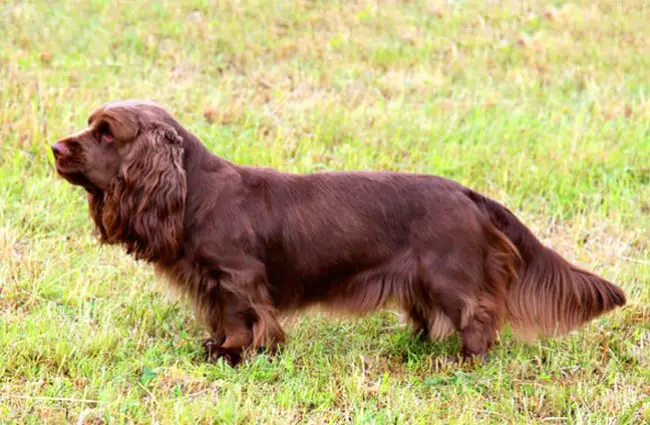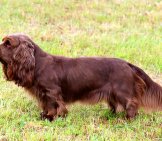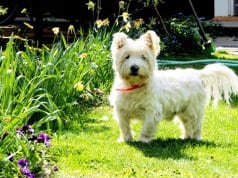The Sussex Spaniel is not what you would expect from a spaniel. Where most spaniels are graceful and elegant, Sussex Spaniels are, well, a bit short. Breeds like the Cavalier King Charles Spaniel are known for their poise and acceptance.
The Sussex Spaniel can be a bit grouchy with strangers. That’s not to say this breed isn’t worthwhile! These dogs make steady companions, and certainly have the beautiful coat you would expect of them. Read on to learn more about the Sussex Spaniel.
Description of the Sussex Spaniel
These dogs were bred to be short, believe it or not. While they retain the hunting prowess of standard spaniels, they are also able to easily make their way through brush and brambles. This is certainly one dog where form follows function.
They are still quite beautiful, with gentle eyes and flowing ears. The Sussex’s tail is bobbed. Their hair is long and silky, nearly reaching the floor in some places. They come in a pretty brown hue.
The Sussex is known for his piercing bark, a remnant of his hunting days. This breed needed a reliable way for hunters to find them in dense brush.
Life Expectancy and Size
Most Sussex Spaniels live relatively healthy lives, and can be expected to reach 13 to 15 years old.
This breed is quite heavy for it’s height. They stand just over a foot tall – between 13 and 15 inches. However, they usually weigh between 35 and 40 pounds, justifying their classification as a medium-sized dog.
Protective Ability
This breed is a surprisingly good watchdog for a spaniel. The Sussex has a deep, resonating bark and he’s not afraid to use it. Pair this with a general suspicion of strangers, and you’ve got a walking home alarm system. Keep in mind that it’s a good idea to teach the Sussex Spaniel early in life that he does not have to be afraid of new people. Socialization is important for all dogs.
Training
The Sussex Spaniel is a capable learner with a good memory. This can work in your favor. After all, he will quickly pick up new commands and successfully recall them faster than most dogs.
However, it is important to never lose your cool. The Sussex will remember any small transgression and it can hinder his ability to perform to the best of his abilities. Always be kind with these dogs, and make sure that you don’t resort to harsh words. A positive, rewards-based training plan is the best way to go with these dogs.
Energy Level
Indoors, you may mistake your Sussex Spaniel for a throw rug! They are quite docile, and some individuals won’t admit that they’re quite the formidable athletes. However, take this breed outside and you’ll likely see another side to them. They’re quite playful, and the hunting prowess will quickly be revealed.
As sporting dogs, these spaniels do need plenty of exercise, and should not simply be apartment dwellers.
What Living with a Sussex Spaniel is Like
The Sussex Spaniel can be an enjoyable companion, especially for families. They are loving, calm, and have moderate exercise needs that should fall in line with most active owners.
These dogs are sometimes suspicious of strange dogs and people, so it is important to socialize them early. If carefully introduced, they should be fine with children and other pets.
This breed has a relatively long life expectancy and no major health issues. That being said, their bones and joints are sensitive, especially when they’re young. It is important to be gentle with Sussex Spaniel puppies, and they require more thought than some other breeds.
Care of the Sussex Spaniel
These spaniels have a beautiful coat that can sometimes be tricky.
Environmental Needs
This breed was specifically built to hunt in Britain’s harsh environments. They are outdoorsy dogs, and are able to withstand most temperatures.
Exercise Needs
It is very important to monitor the Sussex Spaniel’s exercise while they’re young. They grow slowly, so their bones and joints are prone to damage. These dogs should not undergo vigorous exercise in puppyhood. Jumping should be limited until they reach 2 years of age.
After the Sussex reaches adulthood, the requirements cool down a bit. They’ll be able to get most of their exercise by playing with the family. However, they also enjoy walks and especially swimming. Of course, the Sussex is a capable hunter and would be happy to join his owners on outings.
Shedding and Grooming
These dogs have a lovely silky coat that requires some care. It should be brushed at least 3 times each week to avoid tangles. It’s not normally clipped, but is often trimmed in problem areas. For instance, long hair on the pads of the feet can cause the Sussex to slip.
Expect some shedding. Seasonally, it may become more profuse. Increasing the frequency of brushing sessions can help manage the excess hair.
Ideal Home Environment
Ideally, the Sussex will find an active family that wants a steady companion. These dogs do fine with well-behaved children. They must be socialized in order to accept other dogs.
It is very important to be gentle with Sussex puppies. Families should not allow them to engage in too much exercise – especially high-impact activities.
These outdoorsy dogs have moderate exercise needs, but are quite outdoorsy. They should have access to a green space, or at least places to go for long and varied walks. These dogs can be barkers, so it’s important that they don’t bother the neighbors too much.
Health Concerns
Heart disease is the most serious problem for this breed, which is not uncommon in other spaniels. Otherwise, they are quite healthy.
Bloat, a serious stomach disorder, can affect Sussex Spaniels. Feed small meals and limit exercise after eating.
Behavior Problems
These dogs can be barky, there’s no way around that.
Remember that the Sussex will only get along with other people and dogs if you teach them to. Begin socialization early to avoid any issue.






















![Red Angus Closeup of a beautiful Red Angus cowPhoto by: U.S. Department of Agriculture [pubic domain]https://creativecommons.org/licenses/by/2.0/](https://animals.net/wp-content/uploads/2020/03/Red-Angus-4-100x75.jpg)

